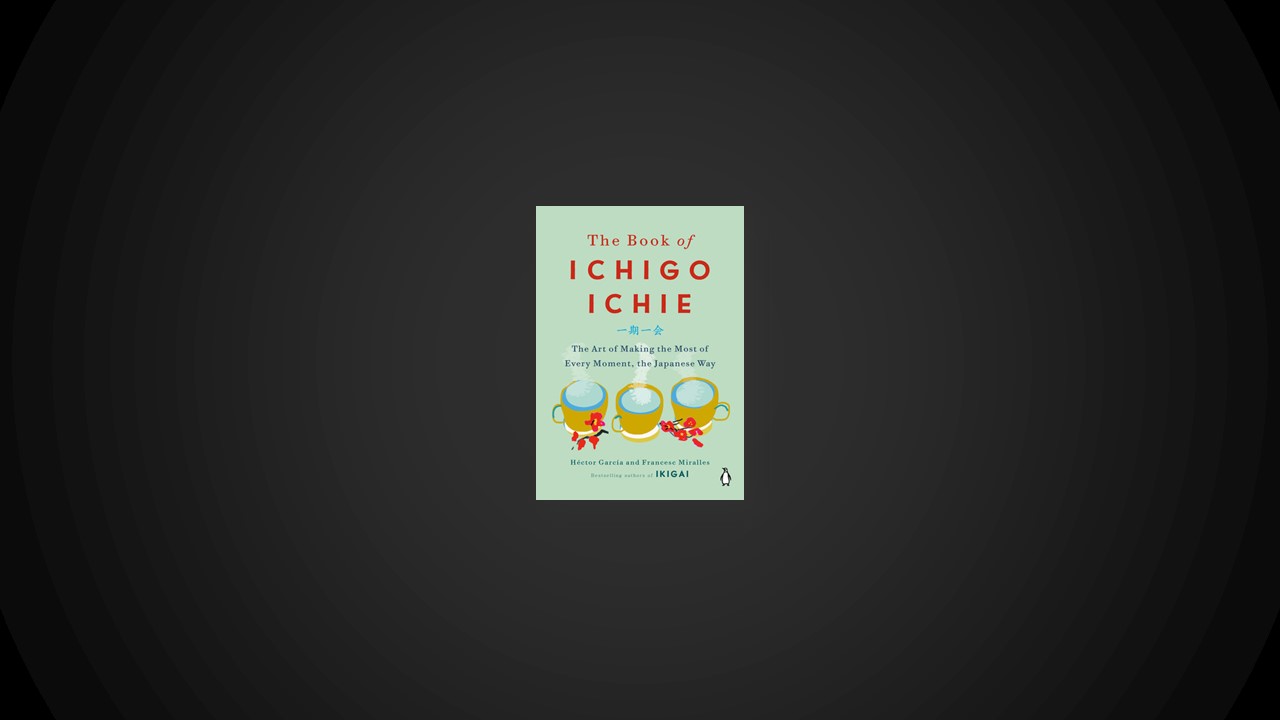Ichigo Ichie
The Japanese characters that make up this book’s central concept don’t have an exact equivalent in English, but let’s look at two interpretations that will help us to understand them.
Ichigo ichie can be translated as “Once, a meeting” and also as “In this moment, an opportunity.” What this means to tell us is that each meeting, everything we experience, is a unique treasure that will never be repeated in the same way again. So if we let it slip away without enjoying it, the moment will be lost forever.
Now or Never
The first part of the term ichigo ichie (一期) is used in Buddhist scripture to refer to the time that passes from the moment we are born until we die.
This is something we all know as human beings but easily forget when we allow ourselves to get caught up in our everyday worries and obligations.
Becoming aware of ichigo ichie helps us take our foot off the gas and remember that each morning we spend in the world, every moment we spend with our children and with our loved ones is infinitely valuable and deserves our full attention.
This is the case, first and foremost, because we don’t know when life will end. Each day could be our last. No one can be sure when they go to sleep that they will open their eyes again the next morning.
As Marcus Aurelius writes in his Meditations, the drama of existence is not death but never having begun to live.
Ichigo ichie is a clear invitation to “now or never,” since though we may manage to live many years, every meeting has a unique essence and will never be repeated.
The Art of Listening
Find the right place for important conversations. An office with loud voices and ringing phones isn’t the best atmosphere for quality communication, and neither is a living room with a television or music at full volume. The first step toward good listening is to do all you can to avoid any source of noise pollution.
Look your interlocutor in the eye. With direct eye contact, we can let our interlocutor know that they matter to us and that we are completely present. However, this eye contact shouldn’t be intimidating. We should pay attention to the other person’s verbal language and make sure they feel comfortable with the amount of physical space between us. This information is valuable and will allow us to make adjustments.
We all have a natural tendency to place filters between ourselves and those we speak to. The key is not to judge. If we limit ourselves to listening to what someone else has to say, we’ll be able to absorb their whole message, and the person will feel heard. For this to happen, we need to prevent our mind from wandering and maintain the discipline of being present.
Ask questions without interrupting. It’s important not to cut people off, since this can cause frustration. What they will value is being asked questions that demonstrate we are still listening. These can be to find out more about what they’re telling us or just to let them know we haven’t lost track of what they’re saying. To do so, we can interject by saying things like, “So you’re saying that . . .” This kind of active listening will be a true gift to those we speak to.
Don’t give unsolicited advice. When someone shares a problem, it can be difficult not to offer a solution, but often what the other person needs most is to be listened to, not to be told what to do. If we think we have something valuable to offer regarding their situation, we can ask, “Can I give you some advice?” or offer a solution indirectly: “Of course, only you can know the right thing to do, but if I were in your position, I would . . .”
The Art of Looking
It’s easy to feel overstimulated in cities, and not just by the noise pollution. Try to get out into the countryside once a week to regain your ability to see. Forests make for a fascinating visual experience. As well as paying attention to different species of trees and plants and to the birds and insects that give life to the landscape, noticing phenomena like komorebi—the play of sunbeams filtering through tree branches, an example of the abstract art in nature—helps us enrich and enhance our sight.
When you walk to work, or go out to run errands, instead of becoming a zombie absorbed in your smartphone, pay attention to the details of your city that usually pass you by. Notice the buildings, the color of the sky, and the shapes of the clouds floating by. In other words, use your eyes to appreciate the world around you, as if you were in an enormous gallery.
When you meet up with other people, pay attention not only to the meeting place but also to the details and nuances that reveal your friends’ emotional state and intentions. Do they look relaxed, or maybe they’re sitting up straight and look tense? What are they doing with their hands? Is their gaze steady, or are they distracted? This kind of attention will give us a deeper look, both literally and metaphorically, at who each person is and at how they are, right here and right now.
The Art of Touching
When you touch something with your hands, like a gnarled tree trunk, close your eyes and imagine that you have ears and eyes in your hands.
Make a habit of touching things in your day-to-day life. When buying an item of clothing, before trying it on, touch the fabric to feel its texture.
When you step out onto the street, be aware of the weather against your skin: feel the cold or the warmth of the sun, the humidity, the breeze . . .
Try walking barefoot on surfaces that can’t harm your feet, such as wood, grass, or even dirt, to awaken the sensitivity in the soles of your feet. Feel how they support the weight of your body and how they move to balance it.
The Art of Tasting
- Blindfold yourself, making sure you can’t see anything.
- Take an apple in your hand and feel its weight and its hardness, and the texture of its skin.
- Lift the apple to your nose and calmly breathe in its scent. This will also allow you to enjoy its flavor much more, since taste and smell reinforce each other.
- Take a bite. Before chewing, feel its flesh on your tongue. Notice what happens to your saliva, then feel it beneath your tongue as well.
- Chew the piece of apple as if it were the only thing in the universe.
The Art of Smelling
Pine for stress relief. In a study conducted at the University of Kyoto, 498 volunteers took two fifteen-minute walks in a pine forest on the same day. At the end of the day, those who had previously been feeling sad, nervous, or angry reported relief. In fact, the most stressed were those who showed the most dramatic improvement. Though we might not have a forest nearby, the scent of pine in an essential oil can provide this sense of peace.
Lavender for sleep. Numerous studies show that this plant with purple flowers is an excellent cure for insomnia, thanks to its tannins, flavonoids, and other natural substances that reduce anxiety and help to ease muscle tension, facilitating rest.
Mint for concentration. Known since ancient times to have an invigorating effect on the mind, mint is used by many college students in the United States to optimize focus while studying. It can also revive the body after an exhausting day, and thus a few drops of mint oil are often used in the bath.
The Ten Rules of Ichigo Ichie
- Don’t postpone special moments.
- Live as if this were going to happen only once in your life.
- Dwell in the present.
- Do something you’ve never done before.
- Practice zazen. You can sit on a meditation cushion or just sit down and observe the miracle of life. The simple fact of stepping away from the daily whirlwind of hurry and obligations will open the doors to well-being.
- Apply mindfulness to your five senses.
- Notice coincidences. Being aware of coincidences helps us get better at reading signs sent by the universe. A journal in which we keep notes of these moments of daily magic will increase our ability to follow the invisible threads of reality
- Make every gathering a party. Don’t wait for the right circumstances—a vacation, a trip, a birthday—to experience extraordinary things. With the right frame of mind, every day can be a celebration.
- If you don’t like what there is, make something different.
- Be a hunter of special moments. Like with any activity, the more you practice, the better and more abundant the results will be.


